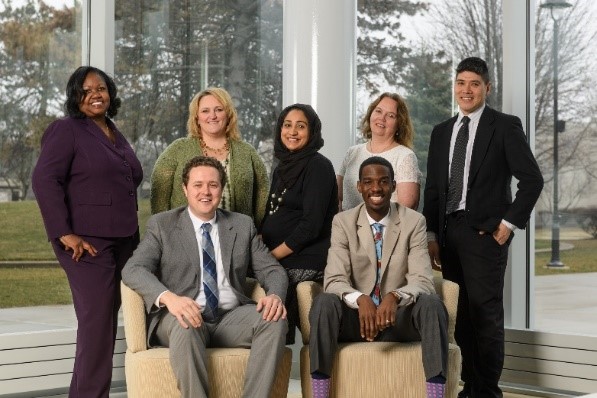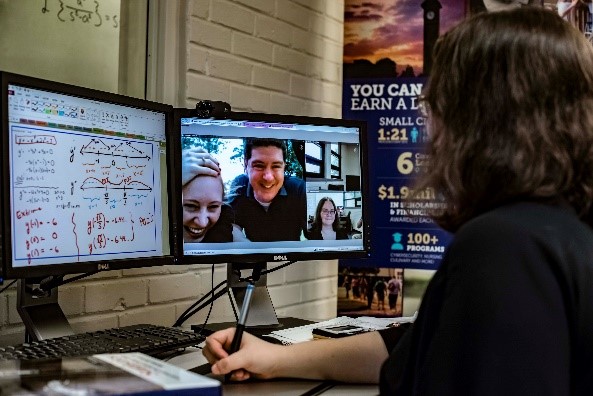Award-Winning Programs at League Board and Alliance Institutions Exemplify Community College Innovation

Congratulations to the 2018 Innovation of the Year Award winners! Forty-six institutions submitted innovations for a 2018 Innovation of the Year Award. Some of the innovations are described below. Click here for a full list of winners.
Wake Technical Community College: Launching North Carolina's First Associate Degree Program in Healthcare Simulation Technology
Wake Tech has become a leader in healthcare simulation in North Carolina by developing state-of-the-art simulation labs in its Nursing, Radiology, EMS, Dental Assisting and Hygiene, and other allied health programs. Working in this context, Professor Lee Wittmann recognized the need for training support personnel to help colleges, universities, clinics, and hospitals maintain and maximize the value of this equipment. In his 2017 Applied Benchmarking Project, Wittman researched, developed, and launched North Carolina's first associate degree program in Healthcare Simulation Technology, one of a few in the country. Students will learn how to operate low-, mid-, and high-fidelity simulation mannequins, various task trainers, and AV tools used in simulation, and manage standardized patient programs. Graduates of the program will be eligible to work at hospitals, educational institutions, emergency medical services agencies, and simulation centers, and to sit for national certification exams.
Moraine Valley Community College: Withdrawal Pilot in Gateway Courses

Students can withdraw from courses with little interaction between themselves and the institution, enabling them to make potentially uninformed decisions about their course performance or finding resources for success. This can lead to negative consequences—financial aid issues, delayed program completion, or withdraw from the college. A pilot project to restrict online withdrawal from high withdrawal rate gateway courses has demonstrated promising results. In spring 2016, a subgroup examined courses that traditionally had high enrollments and high withdrawal rates. The group implemented a pilot withdrawal process to introduce an intentional barrier for students, whereby any student who wished to withdraw from the course would have to complete a withdrawal form and meet with their instructor or a Student Success Specialist to sign off on their withdrawal. In two courses, the withdraw rate was cut almost in half, and the success rate increased by at least eight percentage points.
Central Arizona College: Education at the Speed of Industry
To meet the growing demand for industrial craft professionals in Arizona, Central Arizona College, along with Sundt Construction Company, designed, developed, and delivered a new Industrial Construction program in less than three months. The program consists of five stackable certificates equaling 30 hours that fully align with NCCER requirements and includes embedded OSHA standards and workplace skills. This partnership is unique in that Sundt and CAC designed every aspect of the courses and programs jointly. The need for CAC to work at the same speed of industry and develop the program quickly was successfully accomplished with faculty and industry subject matter experts working collaboratively. This was a pivotal moment in traditional higher education course and program development and design. Once students earn their certificates, those who are hired by Sundt receive a $1,000 tuition reimbursement to help defray the cost of the program, which now has 180 students.
Johnson County Community College: Addressing Student Food Insecurity

"JCCC Meal Share: Addressing Student Food Insecurity" provides a convenient means for financial aid eligible students to load excess dollars—those remaining after tuition and books—onto their student ID cards for food. Some studies show that a significant portion of community college students may not be certain where their next meal is coming from and may not be getting proper nutrition. Jason Arnett, along with colleague Claudia Arnett, collaborated with departments across the college to develop the system. Once that was in place, they worked with JCCC’s Foundation to obtain a grant to support those whose students who are non-financial aid eligible but still face food insecurity. The project was entirely self-initiated, not something assigned by a supervisor. Arnett’s passion and leadership has inspired us all, and more than 200 students so far have benefited from this new program.
Pensacola State College: Virtual Tutoring Program

Pensacola State College’s Virtual Tutoring Program provides students access to free, online, synchronous tutoring services from any location with any electronic device with an Internet connection. Using a webcam, an electronic tablet, and screen-sharing software, a tutor can answer questions, provide detailed explanations, and illustrate complex concepts using both audio and video capabilities. Using calculator demonstration software, tutors can display advanced scientific and graphing calculations required in many mathematics and science courses. Screen capture software is used to record virtual tutoring sessions for repeated viewing. Notes created during sessions are converted to PDF documents and shared with the student. Importantly, tutoring services include late night and weekend virtual sessions for students who may be unable to come to a campus during the traditional school day, thus removing barriers that previously prevented many from pursuing individualized tutoring.
Visit the League’s website for more information about the Innovation of the Year Award.
Sherry Sklar is Membership and Social Media Director at the League for Innovation in the Community College.
Opinions expressed in Innovation Showcase are those of the author(s) and do not necessarily reflect those of the League for Innovation in the Community College.










